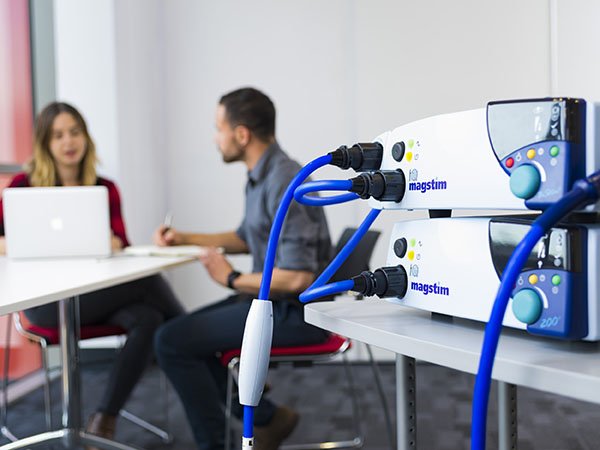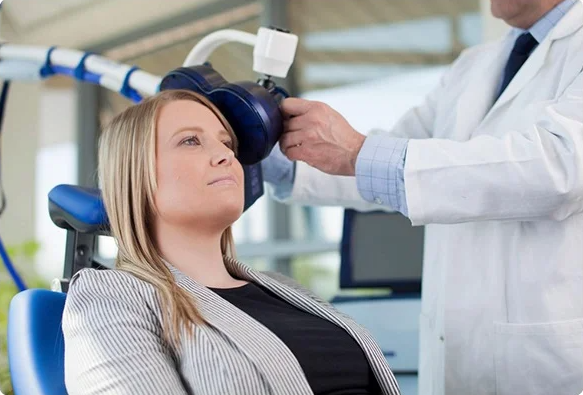The Magstim name is at the forefront of the evolution of transcranial magnetic stimulation (TMS) from its conception as a valuable research tool to its coming of age as a revolutionary treatment for nerve and brain disorders such as major depressive disorder (MDD).
In the US, TMS therapy is appropriate for adults with Major Depressive Disorder (MDD), who have failed to achieve satisfactory improvement from prior antidepressant medication in the current episode.
The USA Food and Drug Administration (FDA) cleared Magstim TMS Therapy systems for the treatment of Major Depressive Disorder in adult patients who have failed to achieve satisfactory improvement from prior antidepressant medication in the current episode.


Magstim® is the brains behind TMS and our equipment is used in the majority of clinical studies worldwide. Approximately 58% of patients with treatment resistant MDD respond positively to TMS therapy.1
MagStim Repetitive TMS (rTMS)
While the symptoms of depression can be debilitating, it is a treatable condition. Common treatment options often involve antidepressant medications, talk therapy or both. For those with treatment-resistant depression (TRD), though, these often won’t have any effect on symptoms.
Patients who haven’t received results from their other treatments now have a safe and effective option available. MagStim Repetitive TMS (rTMS) is a revolutionary treatment approved by the U.S. Food and Drug Administration that can help adults with depression experience an improvement in their symptoms.
TMS is performed in a doctor’s office or clinic. Treatment sessions last less than 5 minutes and are typically performed 5 days per week, over a six-week period. You will be seated in a comfortable chair, some measurements may be taken and you may be provided with earplugs. Your doctor will position the magnetic coil on your head and treatment will begin.
Magstim TMS Therapy uses short pulses of magnetic energy to stimulate nerve cells in the brain. These magnetic pulses are delivered to the area in the brain that researchers believe is responsible for emotional judgement and mood regulation.¹ The rapid magnetic pulses created by the TMS system, pass through the skull and generate an electric current in the brain directly under the treatment coil. These electric currents cause neurons to fire and stimulate surrounding brain cells.
You may feel a moderate tapping on your head under the treatment coil and you will remain awake and alert throughout treatment. Following your session, you will be able to drive home and you can resume normal activities for the rest of the day.
What Is rTMS Treatment for Major Depressive Disorder?
With rTMS treatment, short pulses of magnetic energy are delivered to the specific area of the brain that’s believed to be responsible for mood control. These rapid pulses go through the skull to stimulate and alter the electrical events occurring in the brain, making this treatment ideal for patients with major depressive disorder (MDD).
Targeting the area right underneath the treatment coil, this noninvasive therapy encourages the neurons in the brain to begin firing and stimulates the surrounding cells. Using transcranial magnetic stimulation allows your doctor to increase the activity in the parts of your brain that have experienced a slowdown due to MDD.
Benefits of rTMS Treatment
While treatment options like antidepressant medications or electroconvulsive therapy do work for some patients, they can have several — and sometimes severe — side effects.
Because antidepressants are systemic, the medication gets absorbed directly into the patient’s bloodstream, which means they can cause symptoms ranging from nausea to sexual dysfunction. Unlike medications, however, rTMS treatment doesn’t have any systemic side effects.
Similarly, electroconvulsive therapy (ECT) is an intense treatment that can lead to side effects like insomnia, dizziness and memory loss. Patients will need to be anesthetized and restrained in a hospital to receive this treatment. With rTMS, patients remain awake and are able to get back to their daily routine after their short outpatient procedure.
Comparing Depression Treatments and Side Effects
TMS vs Antidepressants
TMS is typically prescribed when antidepressants have failed, or the side effects are intolerable.
Antidepressants are systemic, which means that the medication is absorbed into the blood stream. This can cause numerous side effects. TMS is a non-invasive, outpatient procedure with no systemic side effects.
TMS vs ECT
TMS and Electroconvulsive Therapy (ECT) are both effective in the treatment of depression, but ECT is associated with more side effects and is significantly more intense.
ECT is performed in a hospital and you must be anesthetized and restrained during the procedure. ECT works by applying a brief electrical pulse to the brain that medically induces a seizure.

How MagStim Repetitive Sessions Work
TMS is performed in a doctor’s office or clinic without any needed anesthetic. Treatment sessions last less than 5 minutes and are typically performed 5 days per week extending over a six-week period. The patient sits in a comfortable chair and may be provided with earplugs. Some measurements may be taken before positioning the magnetic coil on the patient’s head before treatment begins. During the session, many patients read, watch television, or just sit back and relax.
Magstim TMS Therapy uses short pulses of magnetic energy to stimulate nerve cells in the brain. These magnetic pulses are delivered to the area in the brain that researchers believe is responsible for emotional judgment and mood regulation. The rapid magnetic pulses created by the TMS system pass through the skull and generate an electric current in the brain directly under the treatment coil. These electric currents cause neurons to fire and stimulate surrounding brain cells.
Patients remain awake and alert throughout the treatment session. Some people report feeling a moderate tapping on their head under the treatment coil and hear a clicking sound. When the session concludes, patients are able to drive home and may resume normal activities for the rest of the day.
What to Expect From rTMS Treatment
Your MagStim Repetitive TMS Treatment will be delivered in either a doctor’s office or clinic about five times per week for six weeks. During your treatment sessions, you’ll get to relax in a comfortable chair, and you’ll be able to read, listen to music or watch TV while being treated.
During this time, you may feel some moderate tapping on your scalp and hear a clicking sound. This tapping is usually under the treatment coil where the device is delivering the short pulses of magnetic energy.
Once this painless, noninvasive procedure is complete, you’ll be ready to resume your regular daily routine.
Getting Started on Magstim Repetitive TMS Treatment
A person who has MDD and is either unresponsive to prescription medications to treat it or finds the side effects too difficult to tolerate can investigate if TMS treatment is right for them. A prescription for it is required, which can be provided by a psychiatrist who conducts a thorough evaluation to determine if TMS is the right approach to try. The evaluation will take into consideration things like a patient’s history, their past and current medication usage, previous attempts at treating their depression, and any possible health risks.
The psychiatrist will determine what frequency of appointments is needed and the length of each one. When treatment is approved, a patient can decide where to receive treatment. The patient will be monitored with regular check-ins with their psychiatrist to monitor progress made and any side effects that occur.
TMS therapy is covered by most insurance plans, including Medicare. Some states also allow Medicaid coverage of it. Prior authorization is typically required for insurance coverage, making it important to check on that before scheduling any sessions.
TMS vs Antidepressant
TMS is typically prescribed either when a person’s MDD does not respond to the use of antidepressants or the side effects they experience due to using the medications prove intolerable. Antidepressants are systemic, which means that the medication is absorbed into the bloodstream. Many people who take prescription medications for depression experience numerous side effects. TMS is a non-invasive, outpatient procedure with no systemic side effects.
TMS vs ECT
TMS and Electroconvulsive Therapy (ECT) are both effective in the treatment of depression, but ECT is associated with more side effects and is significantly more intense. ECT is performed in a hospital and the patient must be anesthetized and restrained during the procedure. ECT works by applying a brief electrical pulse to the brain that medically induces a seizure. TMS requires no hospitalization, anesthesia, or restraining.
While some people do experience possible side effects from TMS, they typically occur only during the treatment sessions and are temporary. Side effects may include tenderness of the scalp, headache, jaw pain, or tooth pain. In rare incidences, a seizure may occur.
Where Can Patients Receive rTMS Depression Treatment in South Florida?
My TMS has several locations throughout South Florida where patients can receive treatment:
At each location, patients can expect top psychiatric care. Your psychiatrist will develop a detailed plan telling you how often you will come in for treatment and how long each appointment will be. Throughout the process, you’ll have regular check-ins with your psychiatrist so they can stay updated on your progress.
Along with TMS therapy, our four locations provide patients with access to mental health services such as substance abuse treatment and outpatient care.
Reach out to Request a Consultation
Receiving MagStim repetitive TMS treatment here in South Florida is easier than ever. At My TMS, we’ll evaluate your condition and help you determine if this treatment option is right for you. Our team will also make sure we accept your health insurance before we begin treatment.
Ready to get started? Give us a call at 954-332-0740 or fill out our contact form to book an appointment.



